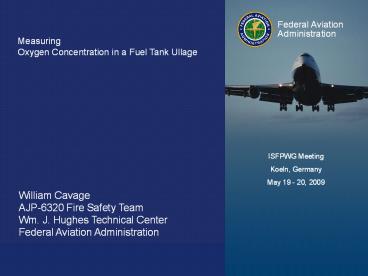Measuring PowerPoint PPT Presentation
1 / 13
Title: Measuring
1
Measuring Oxygen Concentration in a Fuel Tank
Ullage
ISFPWG Meeting Koeln, Germany May 19 - 20, 2009
William CavageAJP-6320 Fire Safety TeamWm. J.
Hughes Technical CenterFederal Aviation
Administration
2
Outline
- Background
- Technologies/Methods Examined
- Test Equipment and Procedures
- Results
- Previous Results
- Calibration Gas Exposure
- Flight Simulation
- Summary
3
Background
- FAA has been seeking to improve fuel tank safety
in the wake of TWA Flight 800 in July of 1996 - Rule published requiring extensive flammability
reduction on both future built and existing
aircraft on present types - The measurement of ullage oxygen concentration is
important to the fuel tank inerting community
when researching methods, validating models, and
certifying systems - FAA method for measuring ullage oxygen
concentration at reduced ullage pressures has
been successful but can be cumbersome - Emerging products have the potential to simplify
and improve upon RD / Certification work for
fuel tank inerting
4
Technologies/Methods Examined
- Improved FAA gas sampling method
- Made design changes to OBOAS regulated sample
train and packaging based on lessons learned
during FAA flight testing - New system is lighter, smaller, quieter, but not
proven to have equivalent level of safety - Light Absorption with unregulated gas sample
train (Oxigraf) - Unregulated sample train uses a sensor that
measures infrared light absorption using a
tunable laser diode (TLD technology) - Proprietary software used to interpret spectral
data - Optical fluorescence using in situ probe (ASF)
- Small fiber optic probe uses spectrometer to
interpret coherent light signal which is highly
dependent on temperature/pressure - Used in situ (in place) which has many advantages
(low power, small size/weight, rapid response)
but also has limitations
5
FAA Oxygen Concentration Measurement Method
6
Light Absorption Method using TLD
Oxigraf O2N2 Flight TestOxygen Analyzer
7
Optical Fluorescence (ASF) Used In Situ
8
Testing Performed
- First had all methods used in a PVC tube which
was flooded with various calibration gases at
various temperatures and altitudes - Also examined response time of method by seeing
how long it took for instrument to go from 5 to
15 (within 0.1 of stability) - Second - installed the available methods in test
tank and exposed them to simulated CWT ullage
environment and flight cycle - Used existing 17 cubic foot aluminum fuel tank in
altitude chamber - Put fuel in tank as well as inerted the ullage
with nitrogen - Performed simulated mission with ground heat up,
ascent, cruise, and descent with simulated
inerting system performance - Temperature between 110 -10 ºF, altitudes 0-36K
feet
9
Block Diagram of Fuel Tank Ullage Simulation
10
Results Previously Acquired Data
- Previously performed tests illustrated how the
optical fluorescence method in situ could follow
trends of FAA method with large magnitude errors
- Had trouble giving valid numbers at low partial
pressures - Also the temperature cycling of the mission
seemed to effect the data adversely
11
Results Calibration Gas Exposure
- Exposed all methods to the stated calibration
gases at several altitudes and temperatures
typical of a commercial transport airplane fuel
tank ullage - Preliminary data with optical fluorescence system
did not do well so manufacturer went off to work
out the problems - the FAA method and light absorption method
duplicated calibration gases well (/- 0.2 O2
from 5-15 O2) - The light absorption method was the fastest
responding method with the FAA method and the
optical fluorescence method in a distant second
(more than twice as slow) - The optical fluorescence has the potential to be
the fastest when developmental software is made
more streamlined - FAA method will never be significantly faster
12
Results Airplane Fuel Tank Simulation
- Measured fuel tank test article ullage O2 with
both the FAA method and the light absorption
method
- Results of Oxigraf and FAA method very close
- The inerting of test tank erratic due to
problems, but this illustrates the small
advantage of rapid response
13
Summary
- Both the FAA method and the light absorption
method duplicate calibration gases well at a
variety of conditions and both agree on oxygen
concentration measurements made during a
simulation of an inert commercial transport
airplane fuel tank flight cycle - Light absorption system has faster response time
but appears to be of little advantage - Light absorption system already performed some
flight testing and is slated for more with
several OEMs / Operators - Optical fluorescence method still working out
problems but slated for more chamber examinations
in May

